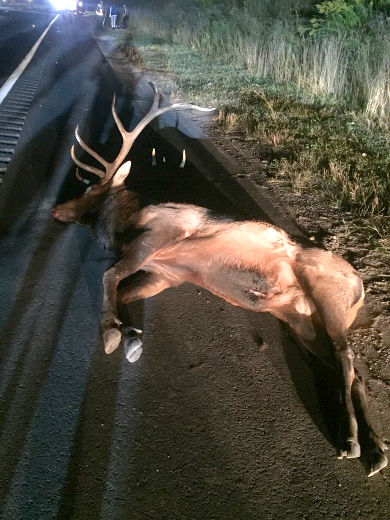
An elk was struck and killed by a driver on Highway 400 near Highway 89 Saturday morning. Provincial police are warning motorists to pay attention driving in Simcoe County and beyond for wildlife on the roadways this fall. PHOTO: SUBMITTED OPP
The good-sized beast – weighing more than 500 pounds – was killed in the crash near the Highway 89 exchange.
The driver and single passenger survived, but the car was soon a complete write-off, said OPP’s Sgt. Kerry Schmidt.
“One minute after the car was hit by an elk, it was rear-ended by an impaired driver,” Schmidt said, adding the drunk driver was charged at the scene.
“The elk hit the hood of the automobile and smashed into the windshield and just destroyed it,” he said. “Amazingly, the people suffered no major injuries.”
While elk may be an anomaly in Simcoe County, moose and deer are roaming the brush and farmlands surrounding all of our highways, said Bob Nichols, spokesperson for the Ministry of Transportation (MTO).
In 2014, one out of every 16 motor vehicle collisions involved a wild animal, he said.
Of the almost 13,200 (13,196) wildlife collisions that occurred three years ago, 87% occurred on undivided two-way roads.
About 41% of wildlife crashes happen between October and December and 52% occur between 5 p.m. and midnight, while just over 18% take place between 5 a.m. and 7 a.m.
With Saturday morning’s crash outside those boundaries, OPP and the MTO are warning motorists to be extra vigilant driving during the fall.
“I suspect this warm weather is not only confusing to us, I can only think what it’s doing to the animals,” said OPP’s Sgt. Peter Leon.
Once the cooler weather arrives, Leon said migratory animals, such as deer, moose and elk, gravitate to higher grounds.
“They’ll move from the low-lying areas they came to in the spring when the food supply was blossoming, to higher elevation,” he said.
But since the warm weather persisted into late-September, wildlife haven’t migrated north yet.
“People need to be cognizant that the weather is going to delay natural movement,” Leon said.
He said there have been three car/wildlife collisions in the past week; one in Honey Harbour, another in the Kawartha Lakes district and another near Joe King’s Road north of Waubaushene.
On Sept. 15, a woman crashed into a bear on Highway 12 between Coldwater Road and Town Line in Oro-Medonte.
The bear died on impact, the woman was taken to hospital with minor injuries.
OPP have investigated more than 6,000 collisions with wildlife this year.
In 300 of those collisions, the driver or a passenger was injured. Only one animal strike was fatal for the driver.
Leon said it’s important to remember deer, moose and elk crossing signs are only posted where there are frequent sightings or crossings, however these animals can be seen anywhere at any time.
Autumn driving
The OPP is reminding motorists to take the following precautions in order to reduce their risk of becoming involved in a collision with wildlife:
- Scan the road ahead from shoulder-to-shoulder. Deer rarely travel alone, so when motorists see one there are likely more nearby.
- Watch your speed and be careful when driving at night. Slowing down will give you more time to react.
- Brake firmly if an animal is standing on or crossing the road, and stop if necessary and safe to do so. Swerving to avoid hitting a wild animal may result in a loss of control and a more serious collision.
- If you do encounter large wildlife such as deer, moose, elk or bears on the road and can safely avoid hitting them, do so, but be absolutely certain that oncoming traffic or soft shoulders do not put you and others at risk.
- Do not direct your full attention to the animal when you take measures to avoid hitting it. Instead, focus your attention on the alternative route you decide to take, again only if this maneuver doesn’t place you and others in danger.
Source: The Barrie Examiner
